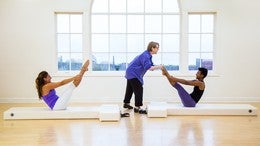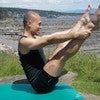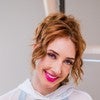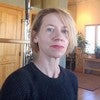Description
About This Video
Transcript
Read Full Transcript
Hi, I'm Rachel Taylor Siegel from the [inaudible] center in Boulder, Colorado. And I've been invited to come and talk about, I guess, returned to life and how I teach control ology from that, those words of Josephs. And what I think first and foremost is that first of all, we're so lucky that we have a method devised by someone who actually wrote it down in a thesis for us to read years and years later and make sense of the myriad, the vast amount of the work that he gave us, just himself and the combinations of the exercises and the equipments together and the combinations of the series with the optional exercises. It's so it, it's huge and it can be a little terrifying, both as a teacher of clients and as a practitioner of Polonius too. And none of us will ever know the full truth, but, um, but as we keep searching and keep exploring and keep practicing the discipline maybe of controller, gee, we grow deeper in our understanding, our bodies grow deeper in their capabilities.
Um, all the things that Joe wanted, control ology [inaudible] was a vision of his, it was his, uh, picture from which he devised everything. And so if we can understand more and more of what he wanted of what he was trying to help people create in themselves, the better we can teach it, the better we can practice it ourselves. And his vision of full body health, natural movement, um, uh, body, mind, spirit, the things that he writes about in return to life are inherent in every single exercise and every single series of exercises because he could not have done otherwise. We on the other hand, have to look at them from the other end and try and fair it out what it was he meant. But of course his work sprung like a Greek God. But he would be happy to hear me say that, um, from his mind forming itself into what we now have as controller [inaudible].
So when, um, when we tried to figure out what it is we want out of PyLadies, whether it's our, in our own bodies or in someone else's bodies as their teacher, we have the words that he wrote and returned to life to inspire us and to help guide us down the understanding of how to transform human beings and help them transform themselves, uh, with, into, or through his vision that created the work. Joseph Palabra, his goal of this amazing health, which he called our natural birthright, was, um, is something for us to pursue intellectually to understand as teachers and as clients. Um, because what it, what holding that or maybe I'm should say standing in that gives us a richness to how we attend to our body's movements and how we attend to our brains thinking, um, that we wouldn't have had otherwise and the gifts that come from it. Um, Joe himself wrote about like, he wanted us to feel the, that animal natural newness, the efficiency of movement, the ability to be strong when needed, the ability to be flexible when needed and both at the same time, the ability to rest when needed, when not needing action and the ability to spring to action, both mentally, physically, we're all three and spiritually comes amazingly from doing this work. And Joe, uh, created the work with that in it. So when we do the work the way he says to the best of our interpretation, that's the product we get.
And further when he would talk to his own clients, not just from his book, but in letters to them and uh, journalistic articles, he talked about how his work could change the world. He talked about how when people become this connected body, mind, spirit, when people are this strong and empowered, and yet this pliant and flexible, not just in their body, but in their minds, then they can make change occur. And of course, that means good change from his standpoint, having lived through such horrors as he did. And they can, uh, be strong and committed when it takes it. We can and we can be flexible when we need to be. We can be compromising in order to achieve our goals as we do.
Every time we work out, we can be the kind of human beings that not only look good but can create amazing good in the world. And His [inaudible]
Any one person can or anyone part of the body. So, you know, putting that on a prosaic level, when we talk about, um, people coming to [inaudible] with injuries and we often look at the injury as if it were the one musician or one broken instrument. And that can never be because that is part of an organ organism. It's part of a whole,
Um, we can see that, um, Polonius can be as small, precise, um, uh, as we need it to be. And it is completely all the time, full body. And when Joe wrote in return to life, how we get to be this amazing transformed human being. He talked about like the ingredients that uh, he created his method with. And so some of those things are words we hear all the time like uniform development. How are we going to become a body that moves like an animal if pieces and parts of us he called, sometimes pet muscles that we love to use, maybe quads for an example or pecs.
How if they take over then we can't move efficiently, we can't move naturally. We are being hindered and his goal is to have us unhindered. So, um, so uniform development is one of the things we as teachers and practitioners are always looking for. And therefore maybe the word repetitions that we do in plays is not such a great word because every time we do a movement it changes us already. And then the next movement changes us again. So whatever that word will be.
Developments are something we are constantly moving constantly, obviously and constantly, uh, growing, changing for the better by doing the simplest of the plotters exercises and what uniform development gives us is better breathing. And he said breathing is the first and last things we do in life. And it is the most important thing and politeness to make the breath, to bring the breath back to our natural way of breathing. No, above all else he says, learn how to breathe. And when we do that, everything in our body is affected. When we breathe. Well, every vertebra, every nerve coming out of the spine, every organ attached to the spine, every brain cell is, uh, is affected by it. So the more oxygen we get in, the more movement our breath takes, the more our body is made for uniform and vice versa. And with that high oxygenation, the other, another thing that we read about him talking about, or another thing that we read that is important to him is circulation. So as we move, Joe developed the movements such that they created better circulation down to the capital areas that don't get much blood.
He talked about in his book and moving that circulation through the body with his choreography, with the equipment is exactly what he intended. The heat that is developed, that is churned up affecting all the parts of us is exactly what he intended to make transformation. And the way the brain has to deal with our movement at a certain tempo, among other things, keeps that heat going. So that change can occur. And we've all felt it. We felt how we lay down where maybe we're a little stiff today, you know, it's too early. It's too late. We came from work, whatever the thing is, we don't feel as good as we could. And after we do, even 30 minutes, even less of our politesse workout, we feel tremendously better.
And that is hard to, um, scientifically, uh, measure. But it's absolutely empirically true and we all know it. So when we do polities, when we teach days, we expect that we're going to, um, transform by the end of it in some fashion for the better. And every time we transform the world transforms. And so what better thing than quote unquote classical PyLadies?
Um, to, to promote in our world today.
Comments
You need to be a subscriber to post a comment.
Please Log In or Create an Account to start your free trial.


















